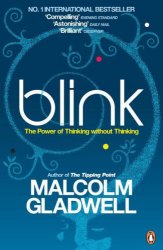Ever had a gut instinct about something that you can't quite justify with logic? That instant reaction that tells you whether or not you like someone or something? Do you realise that you have in-built prejudices that affect your decision making?
Blink is the latest book from Malcolm Gladwell - author of The Tipping Point.
 It explains why bodyguards are deliberately "shot" in training - not with live rounds - so they will be able to continue functioning when under fire in real life, able to override what would inhibit and freeze most people's reactions.
It explains why bodyguards are deliberately "shot" in training - not with live rounds - so they will be able to continue functioning when under fire in real life, able to override what would inhibit and freeze most people's reactions.
The book deals with those instant judgements and instinctive prejudices that pepper your existence. Thin slicing, as Gladwell refers to it, can be a useful tool. But when it leads to wrong or incomplete conclusions, we'd do well to be aware of its influence and plan to compensate.
There's also the problem of having too much data to process - slowing us down and impairing our decision malking.
Amongst the case studies, Blink includes the story of Chicago's Cook County Hospital Emergency Department endlessly faced with the decision of keeping patients with chest pains in for observation and/or treatment, deciding on the level of risk and supervision required. The department slashed the number of factors taken into account in potential cardiac cases down to just three. Countless other measures which had previously influenced the decision were eliminated - deemed to cloud the decision making process.
My first reaction was to be disturbed - you don't mess with people's health - it's not a statistical game of chance. But reading on, the results were excellent: it both improved the rate of successful diagnosis, and sped up the process.
And then there was the US military Millennium Challenge war game in 2000 that went wrong - if you call the enemy team overpowering the data-rich, over-analytical US team anything other than an object lesson in how not to go to war. Instinct, combined with liberating the military management chain to act freely in support of the overall objectives, made the enemy a difficult opponent to beat. They played by different rules. (Worryingly, the answer to this defeat was to tie the enemy's hands behind their backs, and rerun the war game to ensure US victory. Ahem. Lesson not learnt.)
"Every moment - every blink - is composed of a series of discrete moving parts, and every one of those parts offers an opportunity for intervention, for reform, and for correction."
Reading the book during a couple of domestic flights convinces me to be more aware of my gut reactions, and to be better prepared for how people will unwittingly treat and judge me in situations.
Strongly recommended.
1 comment:
Gladwell instinctively felt vindicated already!!!
Post a Comment